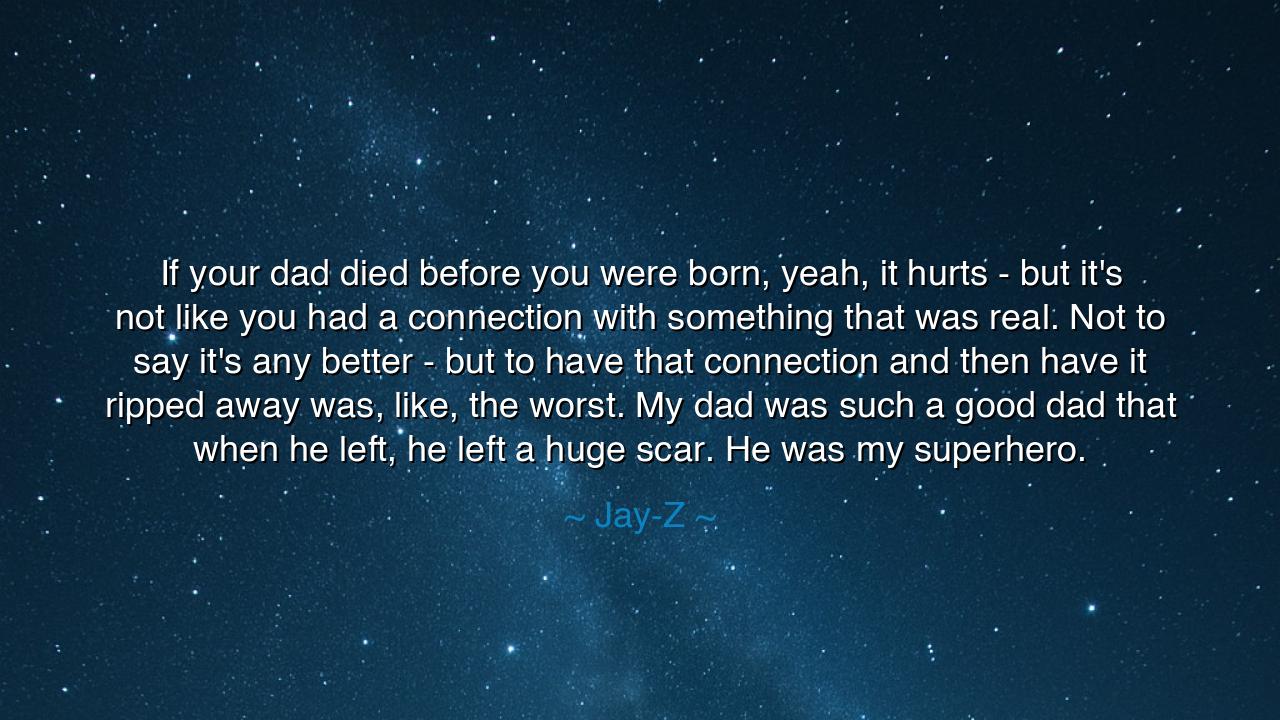
If your dad died before you were born, yeah, it hurts - but it's
If your dad died before you were born, yeah, it hurts - but it's not like you had a connection with something that was real. Not to say it's any better - but to have that connection and then have it ripped away was, like, the worst. My dad was such a good dad that when he left, he left a huge scar. He was my superhero.






The words of Jay-Z—“If your dad died before you were born, yeah, it hurts—but it's not like you had a connection with something that was real. Not to say it's any better—but to have that connection and then have it ripped away was, like, the worst. My dad was such a good dad that when he left, he left a huge scar. He was my superhero.”—are both confession and elegy. They speak not in the rhythm of a song, but in the tremor of memory. Within them lies one of life’s oldest sorrows: the pain of loss, not of what was never known, but of what was once loved and then taken. His words reveal the aching truth that presence, when lost, wounds more deeply than absence ever could. For to have once touched love, and then to find only emptiness where it once lived, is to carry a wound that never fully closes.
At its heart, this quote speaks of the bond between father and child, that sacred connection through which strength, identity, and belonging are born. Jay-Z’s father was not just a parent—he was, as he said, his superhero. To a child, a father’s love is the first shape of the divine: it teaches protection, hope, and guidance. When that figure vanishes, the world itself feels unsteady, as if the sky has cracked open and the sun refuses to rise. The scar he describes is not one of bitterness, but of remembrance—it is the mark left by love too deep to fade, a testimony that what was lost once mattered profoundly.
This truth has echoed through the ages. Consider Telemachus, the son of Odysseus in Homer’s Odyssey. Though Odysseus was absent for decades, Telemachus carried within him the shadow of his father’s greatness. When he finally learned that his father was alive, hope and pain collided within him—the longing for the man who had shaped his soul without ever being present. His journey, like Jay-Z’s reflection, reveals the same lesson: absence defines presence, and the loss of a father leaves a silence that time cannot fill. The deeper the connection, the greater the void.
Jay-Z’s words also unveil a profound understanding of memory and grief. He acknowledges that both the child who never knew their father and the one who loses him after knowing him suffer—but differently. The first grieves the idea of what could have been, while the second grieves the destruction of what once was. His insight is deeply compassionate, refusing to compare pain, yet recognizing the cruel weight of having once held joy in your hands only to see it vanish. There is wisdom in this—an understanding that grief is shaped by love, and the greater the love, the sharper the pain it leaves behind.
In this way, his words are also a reflection on the human condition. Every soul, at some point, experiences this rending—the separation between what is loved and what is lost. Whether it be a parent, a friend, a home, or a dream, we all carry scars carved by the disappearance of what once gave us light. Yet those scars are not signs of weakness; they are the sacred inscriptions of connection. Jay-Z’s acknowledgment of his pain becomes a form of healing, for in naming the wound, he transforms it from silence into strength. Through art, he turns sorrow into song—and by doing so, teaches others how to survive their own losses.
This wisdom has been seen throughout history. Marcus Aurelius, the philosopher-emperor, wrote that loss is the nature of the world—that every person and thing we love is lent to us for a time, not given forever. Yet, he said, what truly belongs to us is the virtue that love inspires—the courage, compassion, and understanding that remain after the loved one is gone. Jay-Z’s reflection carries this same truth: his father’s departure hurt him deeply, but the love that once existed still lives in his heart, shaping him into the man he became. In his grief, there is also gratitude—for to call someone a superhero, even in absence, is to honor what they once gave.
Let this, then, be the teaching for all who come after: cherish those who stand beside you, for time is fleeting. If you have known love, treasure it, for even when it is lost, it leaves behind strength. If you carry scars, do not hide them—they are proof that you have loved deeply and lived fully. And if life has taken someone precious from you, let their memory guide you, not destroy you. For though heroes may fall, the light they give does not die; it burns in the hearts of those they touched. As Jay-Z reminds us, to love and lose is agony—but it is also the greatest privilege of being human. The scar, though painful, is the mark of a heart that once knew greatness, and through remembrance, that greatness endures forever.






AAdministratorAdministrator
Welcome, honored guests. Please leave a comment, we will respond soon